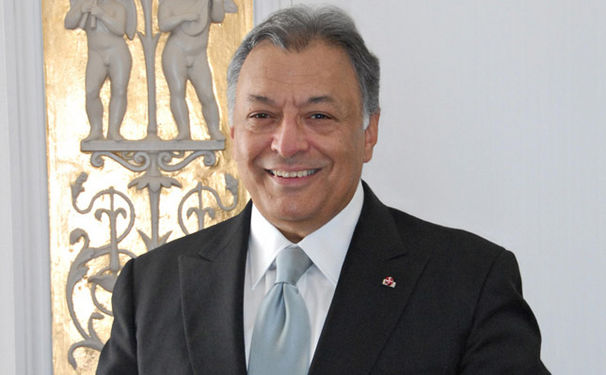Mehta, Israel Phil and soloists come up short in Carnegie program

Zubin Mehta conducted the Israel Philharmonic Orchestra in music of Brahms and Tchaikovsky Thursday night at Carnegie Hall.
There was the obligatory, if half-hearted, anti-Israel protest outside Carnegie Hall on Thursday but inside there was no political message beyond the pairing of the American and Israeli national anthems. Led by their music director Zubin Mehta, the Israel Philharmonic Orchestra presented a program that included two concert favorites, but both came up short in the end.
The only piece that seemed to have thematic significance was the opener, the 1952 Concertino for Strings by Ödön Partos, the Hungarian-born conductor who settled in Israel. Based on his 1932 String Quartet No. 1, the piece feels small, even for a chamber orchestra, as there is a simplicity to the writing that is smothered somewhat by the presence of so many players. The tonality of the piece is intriguing, sounding just slightly “off” but not presenting a real challenge to the listener. Under Mehta’s direction, these strings sounded airy, when a little more sharpness would have helped the work to land more effectively.
Brahms’s Double Concerto for Violin and Cello is a piece with tremendous potential, presenting two very distinct solo voices that nonetheless present a unified vision, often fighting together against the orchestra. While it requires considerable virtuosity from both soloists, neither part really tests its instrument’s technical limits. Still, truly compelling performances of it seem to be comparatively rare, and it tripped up a formidable pair on Thursday: the now-venerable Pinchas Zukerman and his wife Amanda Forsyth, principal cellist of Canada’s National Arts Centre Orchestra.
Forsyth displayed a superb command of color throughout the concerto, singing darkly with her instrument and getting wailing C-string sounds. And yet for all that, she seemed lost. This concerto, like so much of Brahms’s work, is a passionate piece that expresses deep, seemingly pent-up emotions. The cello part in particular, with its soulful writing, is darkly poetic, but in Forsyth’s playing there were no sighs, no caresses. Her technique was muddy, to boot—fast passages came out as a cloudy murk into which she dove and disappeared, later emerging on the other side.
For his part, Zukerman was clearer in his playing. He’s not as nimble as he once was, but still plays with a self-assurance that puts energy behind the music. Oddly, considering their married status, the soloists simply did not communicate musically as a team. This concerto is certainly not a chamber piece, but it has to be approached with the mindset of a chamber player so that there is a give and take between the two voices. Zukerman and Forsyth mostly stood aloof from each other.
Mehta’s direction did not always help matters—He chose a slack tempo for the first movement and engaged the strings with a broad stroke on the usually sharp opening chords that deprived them of their bite. The last movement was his most successful, as the delightful viciousness of the score came through in the orchestra’s furious playing of the main theme.
In Tchaikovsky’s Fourth Symphony they could have matched anyone for sheer depth and fullness of sound. There was gravity in the first movement and lush, mellow tenderness in the second. But for all its warmth and atmosphere, this was a very straight performance, and it took on a meandering quality in its slower sections.
Muffled pizzicati and heavy winds sapped the scherzo of its sparkling charm, and the finale was walked through, the crashing folk dance seeming utterly disconnected from the rest of the movement. There was little sense of the piece’s turbulent dramatic arc, this performance being presented instead as a series of gorgeously played but self-contained, only tangentially related episodes.
A crowd-pleasing program ended with a crowd-pleasing encore: After a few kind words about Marvin Hamlisch, Mehta and the orchestra brought Hollywood flair to a medley of the composer’s most famous tunes.



Posted Mar 21, 2014 at 5:23 pm by Sharon R.
Right on. I was there and soooo disappointed.